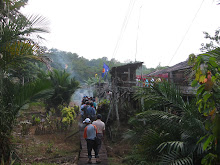The visit had directly and indirectly benefited both SDNU and MADN, and the Dayak Borneo communities in general i.e. to promote, stimulate and undertake to develop Dayak Cross Cultural Training, foster unity among the Dayaks and open up new business avenue(s).
What Is Cross Cultural?

Cross Cultural refer to differences can and do impede upon communication and interpersonal relationships. In the both politic or geopolitics and business world this occurs daily, where people from different cultures interact and are expected to perform and make decisions. The Visit has brought us some ideas to develop Dayak Cross Cultural Training (DCCT) as part of the initiative to enhance our Dayak Cultural Capital.
Why Dayak Cross Cultural Training?
DCCT aims to develop awareness between people where a common cultural framework does not exist in order to promote clear lines of communication, collaboration, cooperation, in-support and better relationships.
DCCT has many benefits to be gained by both participants and business communities. If we were to pursue this initiative, participants in DCCT would likely to achieve from these eleven (11) main benefits:
1. People Learn About Themselves:
Through DCCT, people are exposed to facts and information about their own cultures, preconceptions, mentalities and worldviews that they may otherwise not have contemplated. DCCT helps people learn more about themselves through learning about others.
2. Encourage Confidence:
DCCT promotes self-confidence and self-awareness in individuals and teams through empowering them with a sense of command and control over previously difficult challenges in the workplace.
3. Break Down Barriers:
All of us have certain barriers such as preconceptions, prejudices and stereotypes that obstruct our understanding of other people. DCCT demystifies other cultures through presenting them under an objective light. Through learning about other cultures, barriers are slowly chipped away thus allowing for more open relationships and dialogue.
4. Build Trust:
When people’s barriers are lowered, mutual understanding and transparency or openness ensues, which results in greater trust. Once trust is established altruistic tendencies naturally manifest allowing for greater co-operation and a more productive workplace.
5. Motivation:
One of the outcomes of DCCT is that people begin to see their roles within the workplace more clearly. Through self-analysis people begin to recognize areas in which they need to improve and become motivated to develop and progress.
6. Open Horizons:
DCCT addresses problems in the workplace at a very different angle to traditional methods. Its innovative, alternative and motivating way of analyzing and resolving problems helps people to adopt a similarly creative strategy when approaching challenges in their work or personal lives.
7. Develop Interpersonal Skills:
Through DCCT participants develop great ‘people skills’ that can be applied in all walks of life. By learning about the influence of culture, i.e. the hidden factors upon people’s behaviors, those who undertake cross cultural training begin to deal with people with a sensitivity and understanding that may have previously been lacking.
8. Develop Listening Skills:
Listening is an integral element of effective and productive communication. DCCT helps people to understand how to listen, what to listen for and how to interpret what they hear within a much broader framework of understanding. By becoming good listeners, people naturally become good communicators.
9. People Use Common Ground:
In the workplace people have a tendency to focus on differences. When cross cultural communication problems arise the natural inclination is to withdraw to opposing sides and to highlight the negative aspects of the other. DCCT assists in developing a sense of mutual understanding between people by highlighting common ground. Once spaces of mutual understanding are established, people begin to use them to overcome culturally challenging situations.
10.Career Development:
DCCT enhances people’s skills and therefore future employment opportunities. Having cross cultural awareness would gives our Dayak peoples a competitive edge over others especially when applying for positions in international companies with a large multi-cultural staff base.
11.Business Development:
DCCT would help open up and help develop more business opportunities and other investment possibilities to both SDNU and MADN including the Dayaks in Sabah and others.
Conclusion
The above benefits are but a few of the many ways in which cross cultural training positively affects businesses through staff training and development.



No comments:
Post a Comment